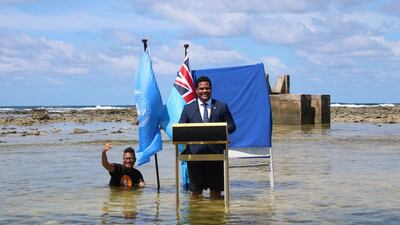More than half of the world’s population could be exposed to drought, floods and dangerous levels of heat by 2050 if global temperatures rise by 2°C above pre-industrial levels, a report has found.
The countries hit hardest will be those that have done the least to cause global warming, leaders said at the Cop26 summit in Scotland on Monday.
The climate change talks, which have entered their second week in Glasgow, is aiming to "keep 1.5°C alive" by securing a deal that will keep the rise in global temperatures below levels that experts say will be catastrophic to many species.
But almost half of the world’s population could still be at risk of a "climate hazard", a report by McKinsey and Company said on Monday.
A 2°C increase in global temperatures will mean 800 million more people struggle to find an adequate supply of water, it said.
The study paints a picture of some countries struggling to support economic activity because of the heat.
Areas affected most by a rise in temperatures could experience conditions that are too hot to sustain outdoor work for at least a quarter of effective working hours a year, the report found.
“The reality is we have been failing the world and we have been failing the most vulnerable communities living on the front lines," former UN general secretary Ban Ki-moon said at Cop26.
Simon Kofe, Foreign Minister of Tuvalu, offered a demonstration of how rising sea levels affect the small island nation by delivering his recorded speech to the conference dressed in a suit and tie while standing knee-deep in seawater.
Cop26 has sought the best way to spend money to help reduce emissions and adapt to crises caused by rising seas, wildfires and increasingly intense storms caused by climate change.
Developing countries want more money for compensation and to help them adapt to higher temperatures, while richer nations have focused on ways to reduce emissions.
On Monday, the UK announced £290 million ($392.7m) in new funding, including support for countries in the Asia Pacific to deal with the effects of global warming.
The charity Christian Aid said some of the most vulnerable countries could face an average 64 per cent drop in the gross domestic products by 2100 under current policies for tackling climate change.
“Those who are most vulnerable to climate change have done the least to cause it. This is fundamentally unfair," said Anne-Marie Trevelyan, the UK’s International Trade Secretary.
The expected economic cost of loss and damage by 2030 has been put at between $400 billion and $580bn a year in developing countries, and up to $1.8 trillion by 2050, the Heinrich Boll Foundation said, quoting academic studies.
Ministers aim to hammer out the last parts of the Paris Agreement - under which countries agreed in 2015 to limit temperature rises to "well below" 2C, or 1.5C to prevent the worst impacts of warming - to make it operational.
Negotiators are trying to hammer out a "cover decision" from Glasgow that will set out how countries will close the gap between the action plans to cut emissions in this decade and what is needed to avoid temperature rises of more than 1.5C.
Cop26 president Alok Sharma said countries must deliver on commitments made in the first week of the summit from tackling deforestation to curbing coal power and cutting methane to prevent dangerous global warming.
Vulnerable countries have pushed for developed nations to revisit plans under the Paris Agreement, known as nationally determined contributions (NDCs), annually to close the gap but the current five-yearly cycle has defenders.
"Here in Glasgow we have a unique opportunity to reach a historic outcome and I am committed to bringing countries together to forge an agreement that means we see more action this decade, which helps to keep the 1.5C temperature limit within reach," said Mr Sharma.


